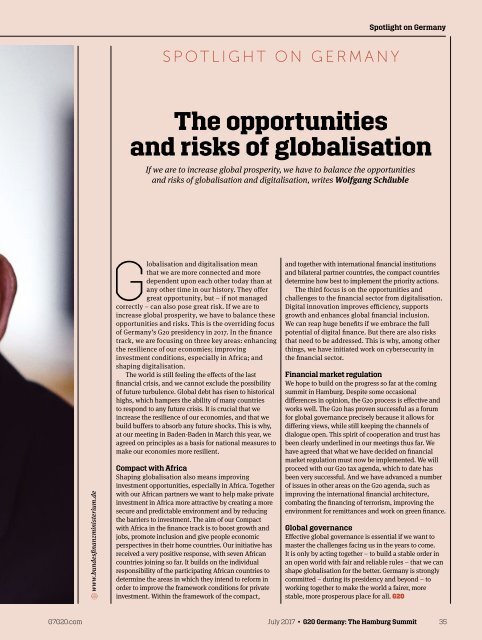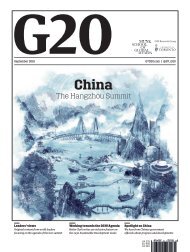G20-Germany-Hamburg-2017
mo.rami@trmg.co.uk
mo.rami@trmg.co.uk
Create successful ePaper yourself
Turn your PDF publications into a flip-book with our unique Google optimized e-Paper software.
SPOTLIGHT ON GERMANY<br />
Spotlight on <strong>Germany</strong><br />
The opportunities<br />
and risks of globalisation<br />
If we are to increase global prosperity, we have to balance the opportunities<br />
and risks of globalisation and digitalisation, writes Wolfgang Schäuble<br />
www.bundesfinanzministerium.de<br />
Globalisation and digitalisation mean<br />
that we are more connected and more<br />
dependent upon each other today than at<br />
any other time in our history. They offer<br />
great opportunity, but – if not managed<br />
correctly – can also pose great risk. If we are to<br />
increase global prosperity, we have to balance these<br />
opportunities and risks. This is the overriding focus<br />
of <strong>Germany</strong>’s <strong>G20</strong> presidency in <strong>2017</strong>. In the finance<br />
track, we are focusing on three key areas: enhancing<br />
the resilience of our economies; improving<br />
investment conditions, especially in Africa; and<br />
shaping digitalisation.<br />
The world is still feeling the effects of the last<br />
financial crisis, and we cannot exclude the possibility<br />
of future turbulence. Global debt has risen to historical<br />
highs, which hampers the ability of many countries<br />
to respond to any future crisis. It is crucial that we<br />
increase the resilience of our economies, and that we<br />
build buffers to absorb any future shocks. This is why,<br />
at our meeting in Baden-Baden in March this year, we<br />
agreed on principles as a basis for national measures to<br />
make our economies more resilient.<br />
Compact with Africa<br />
Shaping globalisation also means improving<br />
investment opportunities, especially in Africa. Together<br />
with our African partners we want to help make private<br />
investment in Africa more attractive by creating a more<br />
secure and predictable environment and by reducing<br />
the barriers to investment. The aim of our Compact<br />
with Africa in the finance track is to boost growth and<br />
jobs, promote inclusion and give people economic<br />
perspectives in their home countries. Our initiative has<br />
received a very positive response, with seven African<br />
countries joining so far. It builds on the individual<br />
responsibility of the participating African countries to<br />
determine the areas in which they intend to reform in<br />
order to improve the framework conditions for private<br />
investment. Within the framework of the compact,<br />
and together with international financial institutions<br />
and bilateral partner countries, the compact countries<br />
determine how best to implement the priority actions.<br />
The third focus is on the opportunities and<br />
challenges to the financial sector from digitalisation.<br />
Digital innovation improves efficiency, supports<br />
growth and enhances global financial inclusion.<br />
We can reap huge benefits if we embrace the full<br />
potential of digital finance. But there are also risks<br />
that need to be addressed. This is why, among other<br />
things, we have initiated work on cybersecurity in<br />
the financial sector.<br />
Financial market regulation<br />
We hope to build on the progress so far at the coming<br />
summit in <strong>Hamburg</strong>. Despite some occasional<br />
differences in opinion, the <strong>G20</strong> process is effective and<br />
works well. The <strong>G20</strong> has proven successful as a forum<br />
for global governance precisely because it allows for<br />
differing views, while still keeping the channels of<br />
dialogue open. This spirit of cooperation and trust has<br />
been clearly underlined in our meetings thus far. We<br />
have agreed that what we have decided on financial<br />
market regulation must now be implemented. We will<br />
proceed with our <strong>G20</strong> tax agenda, which to date has<br />
been very successful. And we have advanced a number<br />
of issues in other areas on the <strong>G20</strong> agenda, such as<br />
improving the international financial architecture,<br />
combating the financing of terrorism, improving the<br />
environment for remittances and work on green finance.<br />
Global governance<br />
Effective global governance is essential if we want to<br />
master the challenges facing us in the years to come.<br />
It is only by acting together – to build a stable order in<br />
an open world with fair and reliable rules – that we can<br />
shape globalisation for the better. <strong>Germany</strong> is strongly<br />
committed – during its presidency and beyond – to<br />
working together to make the world a fairer, more<br />
stable, more prosperous place for all. <strong>G20</strong><br />
G7<strong>G20</strong>.com July <strong>2017</strong> • <strong>G20</strong> <strong>Germany</strong>: The <strong>Hamburg</strong> Summit 35
















